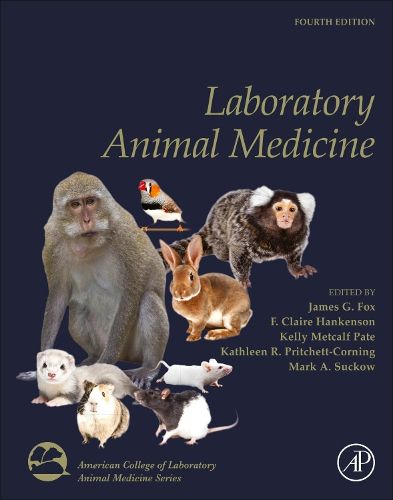Readings Newsletter
Become a Readings Member to make your shopping experience even easier.
Sign in or sign up for free!
You’re not far away from qualifying for FREE standard shipping within Australia
You’ve qualified for FREE standard shipping within Australia
The cart is loading…






Laboratory Animal Medicine, Fourth Edition-a volume in the American College of Laboratory Animal Medicine (ACLAM) blue book series-is the authoritative reference on the biology, health, and care for species involved in research. Edited by recognized veterinary, operational, and research experts and endorsed as the official material for veterinary specialty certification by ACLAM, this work defines the standard for all aspects of humane laboratory animal care and science with animal models. This new edition contains significant changes in content and organization to reflect the evolution of the field. The animal welfare chapter has been moved to the beginning of the book to highlight this subject's importance. Other chapters have either been consolidated to encourage the reader to recognize commonalities such as those between guinea pigs, gerbils and hamsters, or separated out in recognition of expansions in knowledge and cross-species complexity as illustrated by separate new and old world primate chapters. Advances in practice, technology, and knowledge are highlighted in the chapters on genetically modified organisms, with updates on new techniques in genetic engineering and consideration of non-rodent genetically modified models; microbiological monitoring, with an increased emphasis on environmental monitoring and sentinel free colony health monitoring methods; regulatory compliance, with a comprehensive chapter on birds; employee health and safety, with expanded consideration of compassion fatigue; and animal models in biomedical research, with increased emphasis on experimental design and rigor. New chapters on animal models for microbiome, infectious disease, and transplant research have been added to serve as a reference for the community. This book is an excellent reference for veterinarians and research scientists, as well as program directors and facility managers employed in a variety of academic and corporate settings. This edition continues the tradition of this text in setting standards for the research animal science community as well as expanding and updating relevant and essential topics for this specialty field.
$9.00 standard shipping within Australia
FREE standard shipping within Australia for orders over $100.00
Express & International shipping calculated at checkout
Laboratory Animal Medicine, Fourth Edition-a volume in the American College of Laboratory Animal Medicine (ACLAM) blue book series-is the authoritative reference on the biology, health, and care for species involved in research. Edited by recognized veterinary, operational, and research experts and endorsed as the official material for veterinary specialty certification by ACLAM, this work defines the standard for all aspects of humane laboratory animal care and science with animal models. This new edition contains significant changes in content and organization to reflect the evolution of the field. The animal welfare chapter has been moved to the beginning of the book to highlight this subject's importance. Other chapters have either been consolidated to encourage the reader to recognize commonalities such as those between guinea pigs, gerbils and hamsters, or separated out in recognition of expansions in knowledge and cross-species complexity as illustrated by separate new and old world primate chapters. Advances in practice, technology, and knowledge are highlighted in the chapters on genetically modified organisms, with updates on new techniques in genetic engineering and consideration of non-rodent genetically modified models; microbiological monitoring, with an increased emphasis on environmental monitoring and sentinel free colony health monitoring methods; regulatory compliance, with a comprehensive chapter on birds; employee health and safety, with expanded consideration of compassion fatigue; and animal models in biomedical research, with increased emphasis on experimental design and rigor. New chapters on animal models for microbiome, infectious disease, and transplant research have been added to serve as a reference for the community. This book is an excellent reference for veterinarians and research scientists, as well as program directors and facility managers employed in a variety of academic and corporate settings. This edition continues the tradition of this text in setting standards for the research animal science community as well as expanding and updating relevant and essential topics for this specialty field.